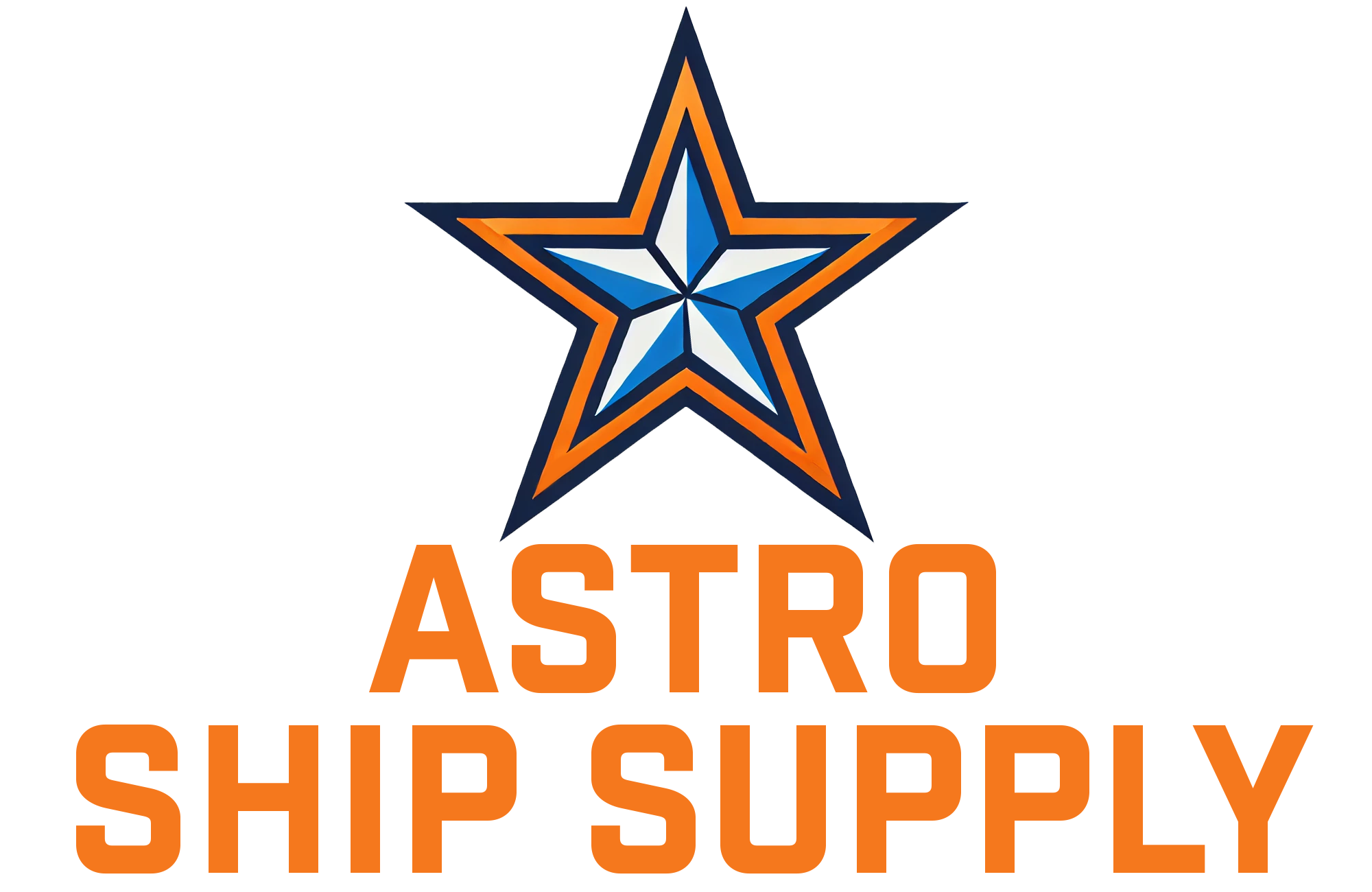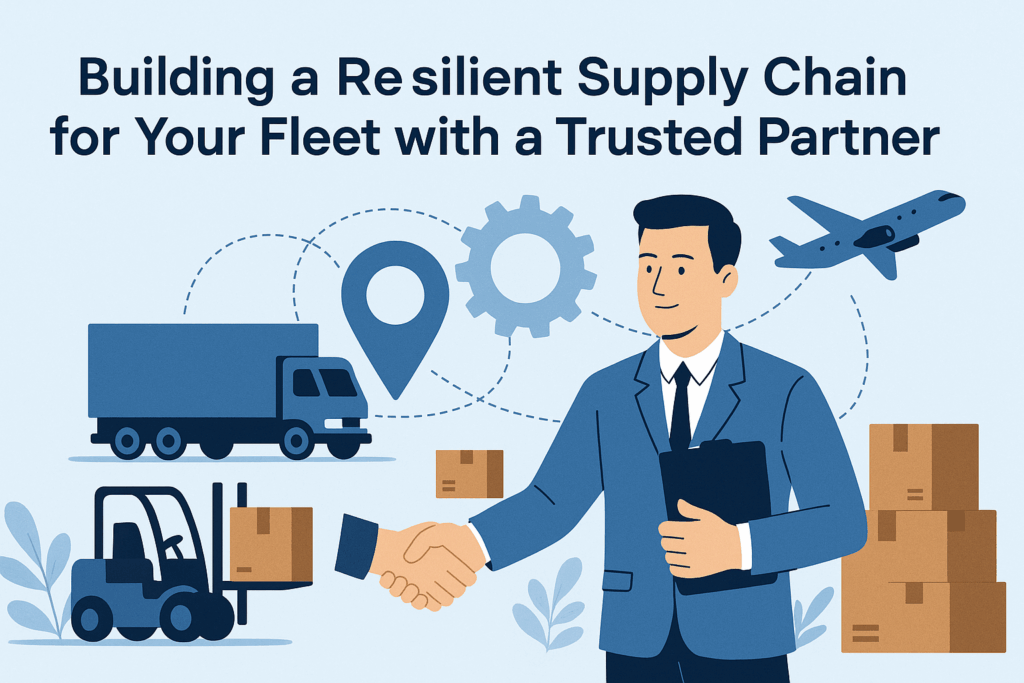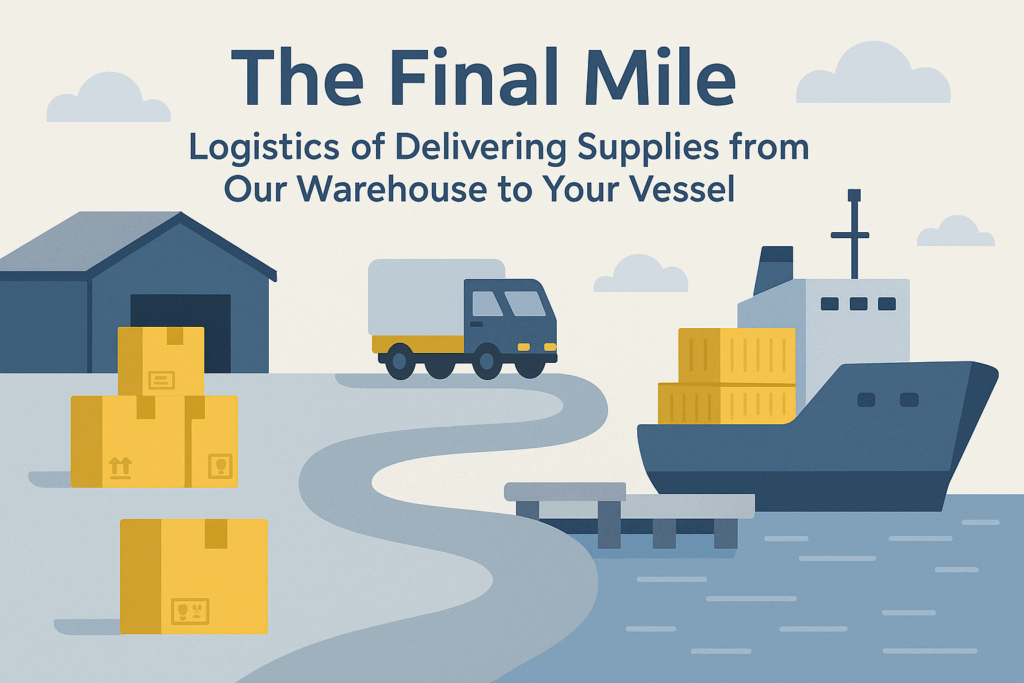The Unseen Engine: Why Seamless Ship Supply is Critical on the Bustling Gulf Coast
The U.S. Gulf Coast, particularly hubs like the Port of Houston, represents a critical artery in the global maritime network. Day and night, vessels of all sizes arrive and depart, carrying the lifeblood of international trade. But behind the scenes of this constant motion lies an equally complex and vital operation: the ship supply chain. Getting this right isn’t just about convenience; it’s about operational efficiency, crew welfare, regulatory compliance, and ultimately, the success of every voyage. For vessel operators and managers, mastering the logistics of provisions, technical spares, and essential supplies in this dynamic region is non-negotiable. Delays, errors, or poor quality can have cascading negative effects, turning potential profits into costly problems.
Imagine a vessel on a tight schedule, needing specialized engine parts and fresh provisions before its next long haul. The clock is ticking. Coordinating suppliers, ensuring quality, managing customs clearance, and guaranteeing timely delivery to the berth requires intricate planning and flawless execution. This is the daily reality of ship supply on the Gulf Coast – a high-stakes environment where reliability and expertise are paramount. Partnering with a knowledgeable and dependable ship chandler isn’t just a vendor relationship; it’s a strategic alliance crucial for maintaining momentum.
Decoding the Gulf Coast Challenge: More Than Just Miles
Supplying ships along the Gulf Coast presents unique hurdles that demand specialized knowledge and robust infrastructure:
- High Traffic Density: Ports like Houston are incredibly busy, meaning berth congestion and tight turnaround times are common. Delivery logistics must be precise to avoid demurrage charges and delays.
- Dynamic Weather Patterns: The Gulf is prone to sudden weather changes, including hurricanes and tropical storms, which can disrupt port operations and supply routes with little warning. Contingency planning is essential.
- Stringent Regulatory Environment: Compliance with U.S. Customs and Border Protection (CBP), health codes (like Texas Department of State Health Services regulations), and international standards such as the International Ship and Port Facility Security (ISPS) Code is mandatory. Non-compliance leads to significant penalties and delays.
- Diverse Vessel Needs: The range of vessels calling at Gulf Coast ports – from tankers and container ships to offshore support vessels – means supply requirements are incredibly varied, demanding a broad sourcing capability.
- Geographical Spread: While Houston is a major hub, the Gulf Coast region encompasses numerous ports and terminals spread across hundreds of miles, requiring extensive logistical reach.
Navigating these challenges effectively requires more than just a truck and a warehouse. It demands local expertise, established supplier networks, and a proactive approach to problem-solving.
The Core Pillars of Comprehensive Ship Supply
A successful ship supply operation rests on reliably delivering across several key categories. Understanding these pillars helps operators appreciate the scope and importance of choosing the right chandlery partner.
1. Provisions & Food Supply: Fueling the Crew
This is perhaps the most fundamental aspect of ship supply. Providing high-quality, safe, and varied food and beverages is crucial for crew morale, health, and productivity. Key considerations include:
- Quality and Freshness: Sourcing fresh produce, quality meats, dairy, and dry goods that meet international standards. Maintaining the cold chain for frozen and chilled items is critical. Look for suppliers adhering to HACCP (Hazard Analysis and Critical Control Points) principles for food safety.
- Dietary Requirements: Catering to diverse international crews with varying dietary needs and cultural preferences.
- Inventory Management: Ensuring adequate stock levels without over-ordering, minimizing waste while preventing shortages mid-voyage.
- Reliable Sourcing: Leveraging a trusted network of food suppliers, like Astro Ship Supply’s Texas-based chain, ensures consistent quality and availability.
2. Deck Supplies & Technical Equipment: Keeping the Vessel Operational
From routine maintenance to critical repairs, vessels rely on a steady stream of technical supplies. This category is vast and includes:
- Deck Stores: Ropes, mooring lines, safety equipment (PPE, life vests), cleaning supplies, paints, and tools.
- Engine Spares: Filters, gaskets, valves, pumps, and other critical components needed for engine room maintenance and repairs. Sourcing genuine or high-quality equivalent parts is vital.
- Navigational Supplies: Charts, publications, signaling equipment.
- Safety Equipment: Firefighting apparatus, life raft servicing supplies, medical equipment compliant with regulations.
Timeliness and accuracy are paramount here. The inability to source a specific deck or engine part can lead to costly vessel downtime.
3. Cabin & Accommodation Supplies: Ensuring Crew Comfort
A comfortable and well-maintained living environment significantly impacts crew well-being. Cabin supplies encompass:
- Linens and Bedding: Sheets, towels, blankets, pillows.
- Toiletries and Cleaning Products: Soaps, detergents, paper products.
- Galley & Mess Room Equipment: Cutlery, crockery, kitchen appliances, cleaning supplies.
- Stationery and Crew Welfare Items: Office supplies, entertainment, basic amenities.
Providing quality cabin and accommodation essentials demonstrates care for the crew, contributing to a positive onboard atmosphere.
4. Bonded Stores: Duty-Free Goods
Bonded stores refer to goods stored under customs control without payment of duties, typically for sale to crew members or for use outside territorial waters. This often includes:
- Tobacco products
- Alcoholic beverages
- Confectionery and snacks
- Perfumes and cosmetics
Handling bonded stores requires strict adherence to customs regulations and secure storage and delivery processes.
The Ripple Effect: Why Seamless Logistics is Non-Negotiable
Failures in the ship supply chain don’t just cause minor inconveniences; they create significant operational and financial ripples:
Poor Supply Management vs. Optimized Logistics: A Comparative Look
- Cost Overruns: Late deliveries can mean missed tides or berthing windows, leading to demurrage charges. Emergency sourcing of parts or provisions is always more expensive. Vs. Proactive planning and consolidated deliveries minimize transport costs and avoid premium charges.
- Vessel Downtime: Lacking a critical spare part can halt operations entirely, costing thousands of dollars per day. Vs. Reliable access to a wide range of technical spares ensures timely maintenance and repairs, maximizing vessel uptime.
- Crew Morale & Health: Poor quality food, lack of familiar items, or insufficient cabin supplies negatively impact crew well-being and productivity. Food safety lapses can cause illness. Vs. High-quality provisions and comfortable accommodation supplies boost morale and ensure a healthy, productive crew.
- Compliance Penalties: Incorrect documentation for bonded stores or failure to meet safety/health standards can result in fines, delays, and reputational damage. Vs. Expert handling of customs paperwork and adherence to all regulations (ISPS, HACCP, Health Dept.) ensures smooth clearance and avoids penalties.
- Safety Risks: Substandard safety equipment or delayed delivery of essential maintenance parts can compromise vessel and crew safety. Vs. Prioritizing quality and timely delivery of safety and technical equipment upholds the highest safety standards.
Strategies for Achieving Seamless Supply Chain Management on the Gulf Coast
Optimizing ship supply requires a multi-faceted approach. Here are key strategies vessel operators should consider, often best implemented through a capable ship chandler:
H3: Rigorous Supplier Vetting and Quality Control
Not all suppliers are created equal. Partnering with a chandler committed to quality, like those certified under ISO 9001:2015, ensures processes are in place to vet suppliers and maintain consistent quality across all product categories. This includes verifying certifications (e.g., HACCP for food) and conducting regular audits.
H3: Proactive Planning and Communication
Effective supply relies on clear communication between the vessel, management, and the chandler. Submitting requisitions well in advance allows for better sourcing and consolidation. A good chandler maintains open communication channels (like Astro Ship Supply’s 24/7 availability via phone, email, or text) and provides regular updates on order status and delivery schedules.
H3: Leveraging Technology
Modern ship chandlers utilize technology for inventory management, order tracking, and communication. Online portals or efficient digital communication methods streamline the ordering process and improve transparency.
H3: Expertise in Customs and Regulations
Navigating the complexities of U.S. Customs and Border Protection requirements, ISPS security protocols, and local health regulations is crucial. An experienced chandler understands the documentation, procedures, and potential pitfalls, ensuring smooth clearance for all supplies, especially bonded stores.
H3: Building Strategic Partnerships
Choosing a ship chandler should be viewed as forming a strategic partnership. Look for a provider with:
- Proven Gulf Coast Experience: Deep understanding of local port operations and challenges.
- Comprehensive Service Offering: Ability to supply provisions, technical stores, cabin items, and bonded goods reliably.
- Commitment to Quality & Compliance: Verifiable certifications and a strong track record.
- Flexibility & Responsiveness: Ability to handle urgent requests and adapt to changing schedules.
- Strong Local Network: Established relationships with quality suppliers and logistics providers.
Use Case: Navigating an Urgent Resupply in Houston
Scenario: The M/V Navigator is scheduled for a 12-hour turnaround at the Port of Houston. Two days before arrival, the Chief Engineer discovers a critical failure in a specific pump assembly needed before departure. Simultaneously, the Chief Steward realizes provisions for specialized dietary needs are running low due to an unexpected extension of the previous voyage.
The Challenge: Sourcing a specific, non-standard pump assembly locally on short notice, coordinating its delivery alongside a large, customized provision order (including fresh, frozen, and culturally specific items), clearing everything through customs, and ensuring delivery within the tight port call window, potentially amidst port congestion.
The Seamless Solution (with a partner like Astro Ship Supply):
- Immediate Communication: The vessel contacts their chandler (available 24/7) with the urgent requirements.
- Rapid Sourcing: The chandler leverages its extensive technical supplier network to locate the exact pump assembly. Simultaneously, their provisions team adjusts the existing order, confirming availability of specialized dietary items through their vetted food supply chain.
- Logistical Coordination: Delivery of the pump and the consolidated provision order (maintaining cold chain integrity) is scheduled precisely to align with the vessel’s ETA and berth allocation, accounting for potential port traffic.
- Compliance Management: All necessary customs documentation is prepared in advance for swift clearance. Food safety protocols (HACCP) are ensured throughout the provision handling.
- Timely Delivery: A dedicated logistics team oversees the transport, ensuring both the technical spares and provisions arrive at the vessel side safely and within the critical window, allowing the M/V Navigator to depart on schedule without incurring delays or compromising safety.
This scenario highlights how experience, network, and proactive management turn a potential crisis into a routine operation.
Comparative Analysis: Key Challenges and Effective Solutions
Managing the ship supply chain effectively boils down to addressing common pain points with proven strategies.
| Challenge | Ineffective Approach | Effective Solution (Best Practice) |
|---|---|---|
| Inconsistent Product Quality | Ordering from cheapest available source without vetting. | Partnering with ISO 9001/HACCP compliant chandlers; Rigorous supplier vetting; Clear quality specifications. |
| Delivery Delays | Late ordering; Poor coordination; Underestimating port congestion. | Advance planning; Proactive communication; Real-time tracking; Experienced logistics coordination familiar with local ports. |
| Compliance Issues (Customs/Health) | Incomplete or inaccurate documentation; Lack of awareness of specific regulations. | Working with chandlers expert in CBP, ISPS, and local health codes; Meticulous documentation management. |
| Difficulty Sourcing Specific Items | Limited supplier network; Reactive sourcing. | Utilizing chandlers with extensive, established networks for both technical and provision supplies; Proactive inventory checks. |
| Poor Communication | Unresponsive suppliers; Lack of status updates; Language barriers. | Choosing partners with 24/7 availability and multiple contact methods; Clear reporting structures; Designated points of contact. |
Quotable Insights: Benefits of an Optimized Ship Supply Chain
- Maximized Vessel Uptime: Timely delivery of spares and supplies keeps vessels operational and earning.
- Enhanced Crew Welfare: Quality provisions and amenities lead to happier, healthier, and more productive crews.
- Guaranteed Regulatory Compliance: Expert handling avoids costly fines, delays, and legal issues.
- Significant Cost Savings: Reduced demurrage, optimized purchasing, and minimized waste contribute to the bottom line.
- Operational Resilience: A reliable supply chain builds resilience against unexpected disruptions.
- Peace of Mind: Trusting your supply partner allows vessel management to focus on core operational duties.
Staying Ahead: The Future of Gulf Coast Ship Supply
The maritime industry continues to evolve, and ship supply is no exception. Trends like digitalization, increasing demand for sustainable products, and heightened security measures will shape the future. Ship chandlers who invest in technology, prioritize sustainability, maintain robust compliance programs, and offer exceptional customer service will be the partners of choice. For vessel operators on the Gulf Coast, aligning with a forward-thinking, reliable chandler like Astro Ship Supply is key to navigating the complexities of today and tomorrow, ensuring every voyage is well-equipped for success.
By prioritizing a seamless, high-quality supply chain, you’re not just stocking a ship; you’re investing in efficiency, safety, and the overall success of your maritime operations in one of the world’s most vital shipping regions.
Frequently Asked Questions (FAQ) about Gulf Coast Ship Supply
1. What makes ship supply logistics particularly complex on the U.S. Gulf Coast?
The complexity arises from a combination of factors: high port traffic density (especially in hubs like Houston), leading to potential congestion and tight schedules; variable weather conditions, including hurricane risks; stringent and multi-layered regulations (US Customs, ISPS, state health codes); the diverse needs of various vessel types; and the sheer geographical spread of ports across the region. Effective management requires deep local knowledge, robust logistics, and strong compliance expertise.
2. How important are certifications like ISO 9001 and HACCP for a ship chandler?
These certifications are very important indicators of reliability and quality. ISO 9001:2015 signifies a commitment to consistent quality management processes across the chandler’s operations. HACCP demonstrates adherence to strict food safety management systems, crucial for ensuring the health and well-being of the crew through safe provisions. Choosing certified suppliers provides assurance of established standards and operational excellence.
3. How can a ship operator ensure timely delivery of urgent or critical supplies?
Timeliness, especially for urgent needs, depends heavily on the chosen ship chandler’s capabilities. Key factors include:
- 24/7 Availability: The ability to contact the chandler anytime.
- Strong Supplier Network: Quick access to a wide range of technical spares and provisions.
- Efficient Logistics: Experienced team to coordinate fast sourcing, customs clearance (if needed), and transport.
- Proactive Communication: Clear and constant updates from the chandler on order progress.
Partnering with a well-established and responsive chandler familiar with the local port environment is crucial for handling urgent requests successfully.
4. What distinguishes a truly reliable ship chandler from an average one?
A reliable ship chandler goes beyond simply taking orders. Key differentiators include:
- Proactive Problem Solving: Anticipating potential issues and having contingency plans.
- Unwavering Commitment to Quality: Rigorous checks and sourcing from trusted suppliers.
- Compliance Expertise: Deep understanding and flawless execution of all relevant regulations.
- Transparency and Communication: Keeping the client informed at every step.
- Flexibility and Adaptability: Handling schedule changes or unexpected requests smoothly.
- Comprehensive Service: Ability to reliably deliver across all supply categories (provisions, technical, cabin, bonded).
- Proven Track Record: Demonstrated experience and positive references within the region.
Reliability is built on trust, consistency, and a genuine partnership approach.
5. Can ship chandlers handle specialized dietary requirements for international crews?
Yes, reputable ship chandlers, especially those serving major international ports like Houston, are equipped to handle diverse dietary needs. This involves sourcing specific food items required for various cultural, religious, or health-related diets (e.g., Halal, Kosher, vegetarian, vegan, gluten-free). It requires a well-established network of specialized food suppliers and careful handling to ensure requirements are met accurately. Communicating these needs clearly and in advance is essential for the chandler to procure the correct items.






